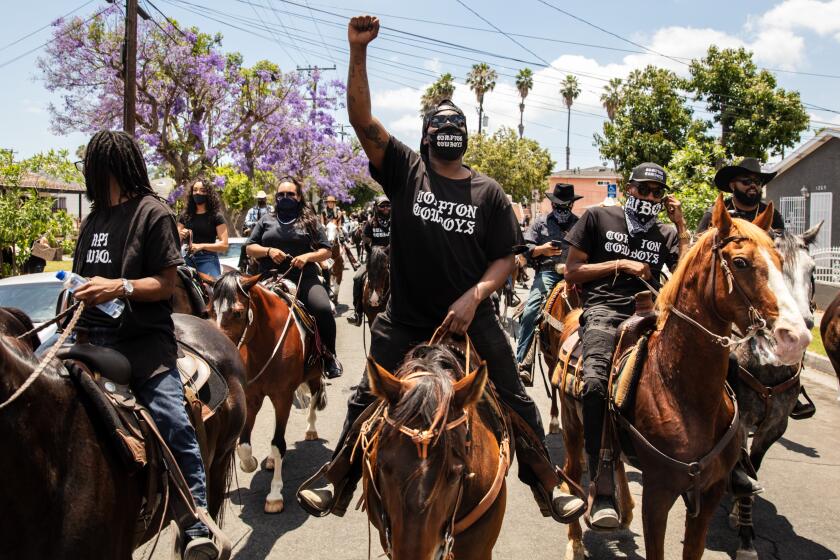‘Streets raised us. Horses saved us.’ Why the Compton Cowboys ride
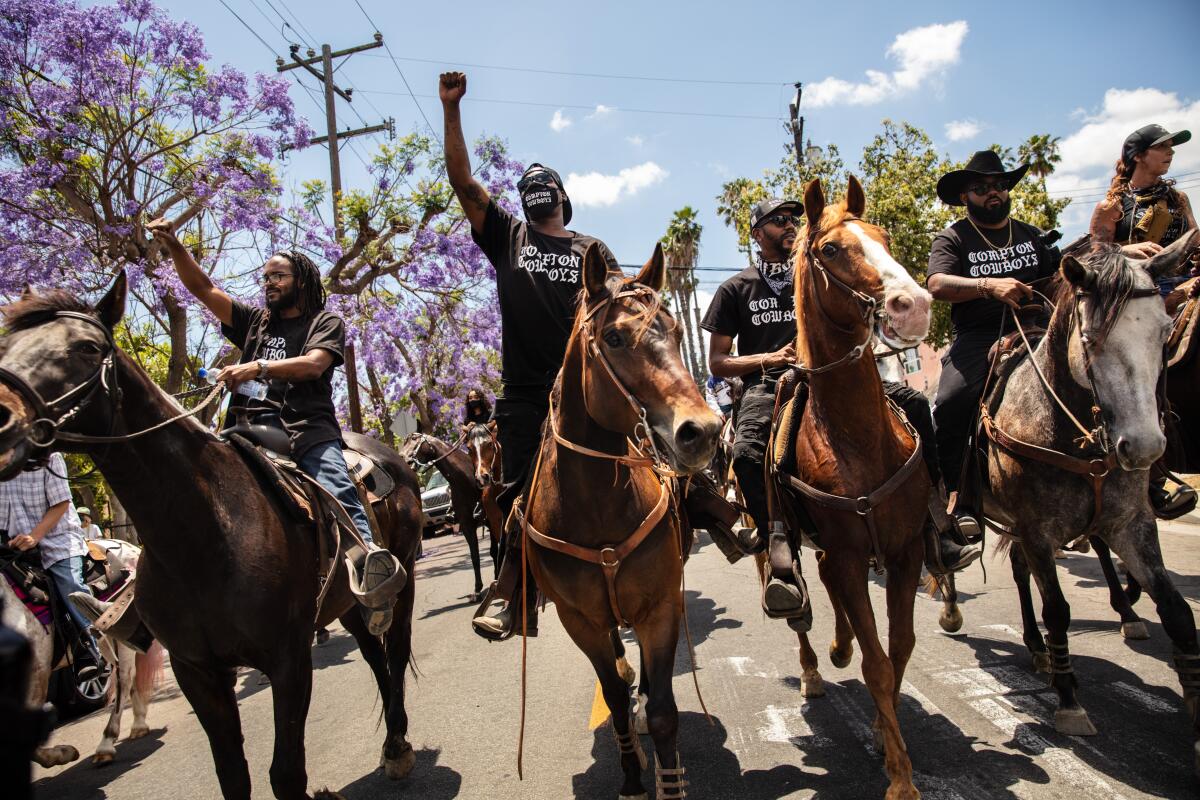
Walter Thompson-Hernández was 6 when he first saw the black cowboys of Compton, and he was fascinated. “They seemed ethereal — like superheroes on the back of mystic creatures,” he writes in his new book, “The Compton Cowboys.”
He grew up just a few miles away in Huntington Park, but his mostly Latino neighborhood was a world apart from Compton. When his mother drove to the Compton Swap Meet on weekends, she made sure that the car windows were closed and the doors locked for fear of crime. It was a confusing message for Thompson-Hernández, who says he was being told that Black people were dangerous, even though he is of both Mexican and African American heritage.
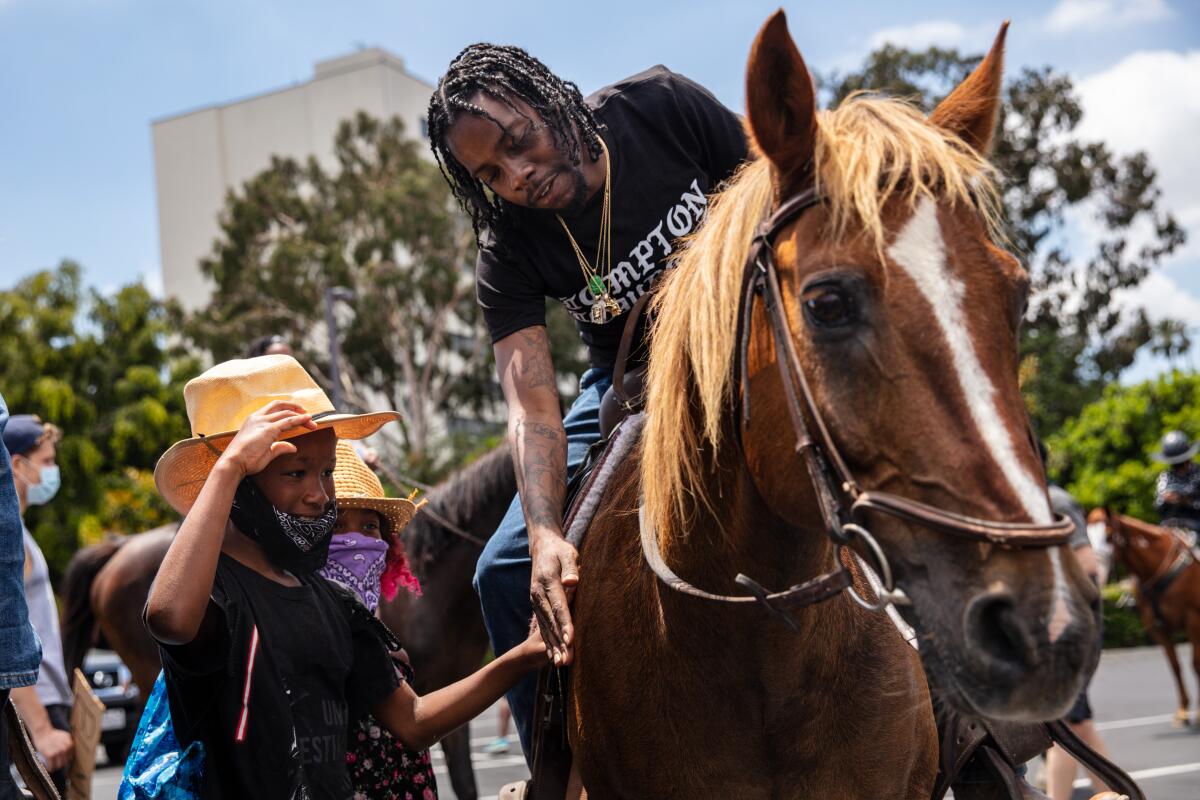
Thompson-Hernández, who joins the Los Angeles Times Book Club for a virtual meetup June 24, traveled the world as a reporter for the New York Times, documenting little-known subcultures such as the persecuted albino community of Ghana and female rappers of Oaxaca, Mexico. But he was drawn back to his Southern California roots to immerse himself in the world of the new Compton Cowboys, a group of young African Americans who find healing and hope on the back of a horse. Their motto: “Streets raised us. Horses saved us.”
In recent days, Thompson-Hernández, a multimedia journalist based in Los Angeles, has been out reporting on civil rights demonstrations in the region, and the cowboys have been riding, urging their followers on Instagram to “be smart and safe in achieving our goals.”
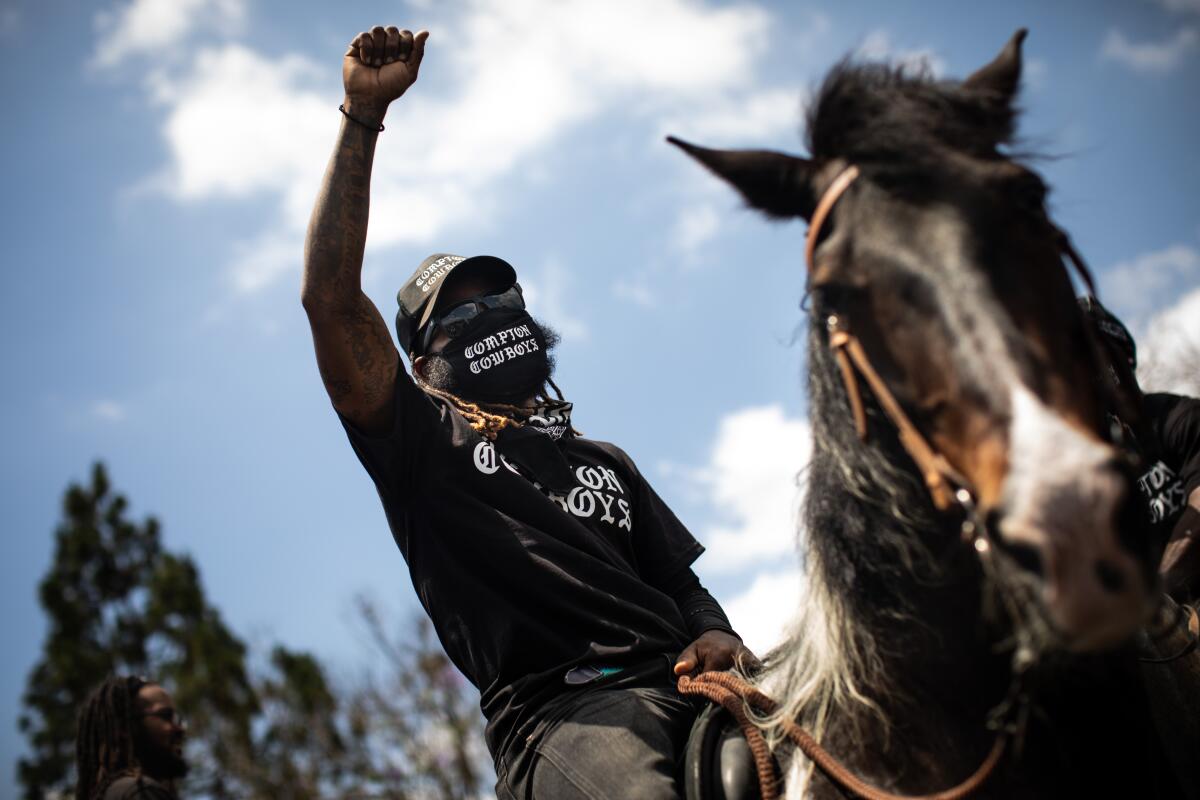
“I think what the past few weeks have really underscored is that it’s still ultimately an incredibly dangerous and a violent place for Black Americans,” said Thompson-Hernández. “It made me think about the places that Black Americans throughout time — and especially right now — have had to forge in the world or their communities to find safety.”
The Compton Cowboys joined a caravan of motorcycles and demonstrators as part of a growing national movement to end police brutality and systemic racism.
For the Compton Cowboys, that place is Richland Farms, an oasis in the heart of urban Compton, where African American cowboys have been welcomed since the 1950s.
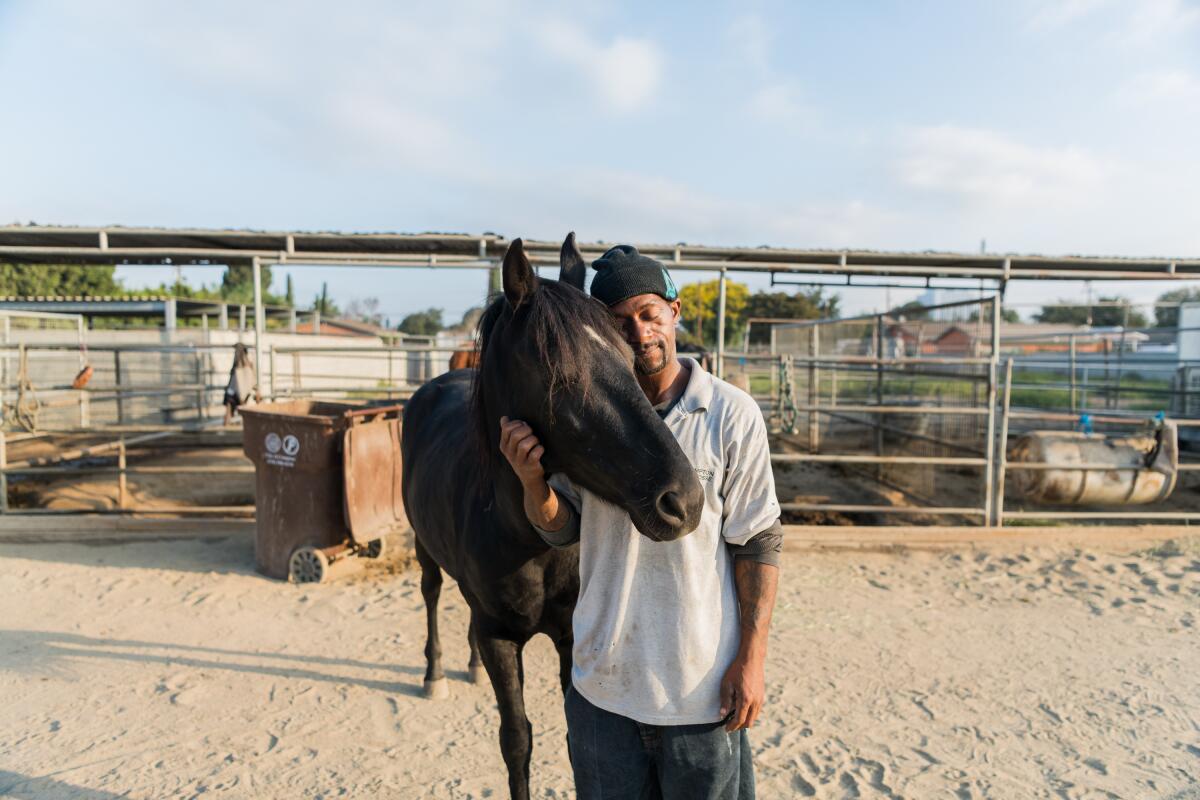
The book tells the stories of 10 current Compton Cowboys — nine men and one woman — who learned to ride as children in what was known as the Compton Jr. Posse. The riding program was established in the mid-1980s as an alternative for young people at risk of gang violence and other perils of the streets.
As they grew older, some drifted away, pursuing competitive sports or starting families of their own; others turned to gangs or drugs. But for each of them, “There was this moment in their lives when they missed that feeling and that connection to these animals — these really compassionate, caring animals that in so many different ways provided a foundation for healing,” Thompson-Hernández says.
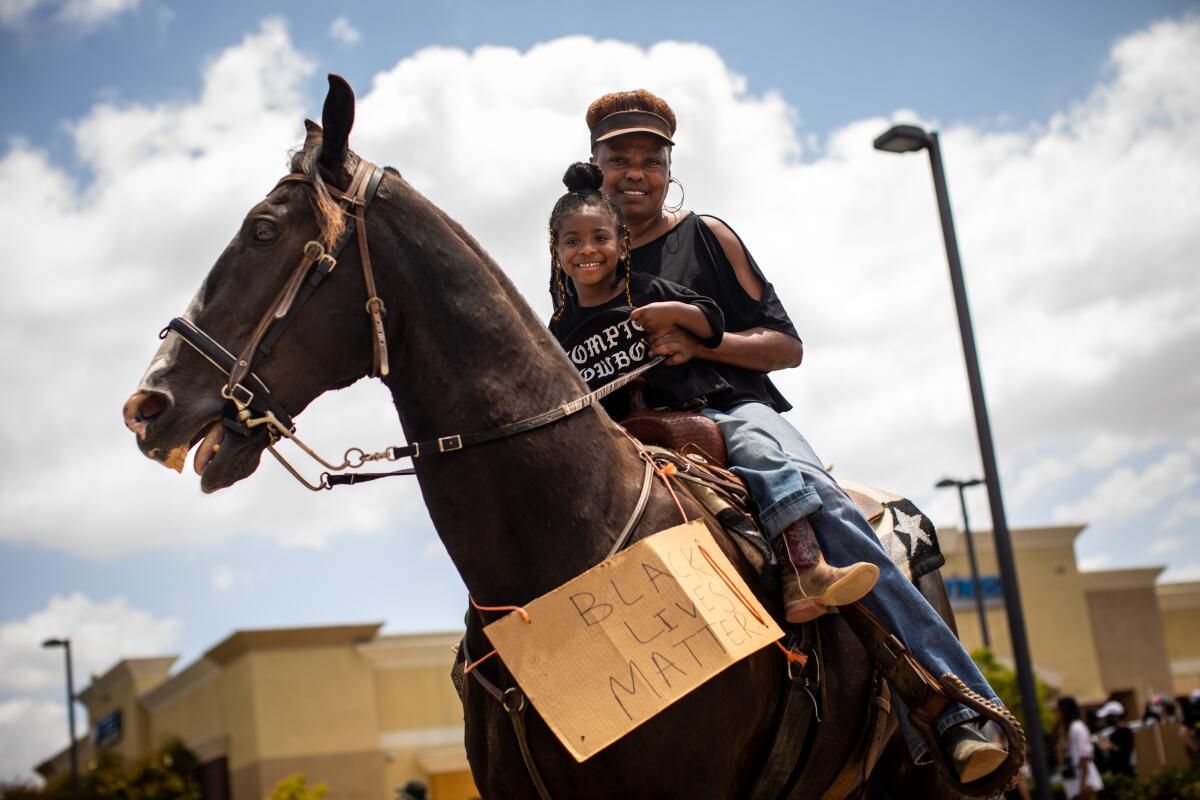
Interacting with the horses, themselves often victims of abuse, has helped the cowboys recover from traumatic episodes in their lives.
Thompson-Hernández writes of cowboy Anthony Harris, who was jumped into a gang at age 8, fired a gun by 10 and was in prison at 18. Struggling through the isolation of a two-year prison sentence on a drug conviction, Harris began to draw images of wild horses, coloring them with dye he made from Skittles candy. When he was released, he found his way back to the ranch.
In his new book, “The Compton Cowboys,” Walter Thompson-Hernández explores the little-known history of black cowboys in Los Angeles County.
Readers also meet Keiara, the only female member of the group. A competitive rider, she’s had to overcome not only an injury suffered in a car accident but also a history of trauma — a dysfunctional family, sexual assault and the killing of her brother. She finds hope and meaning through her love of horses and rodeo competition.
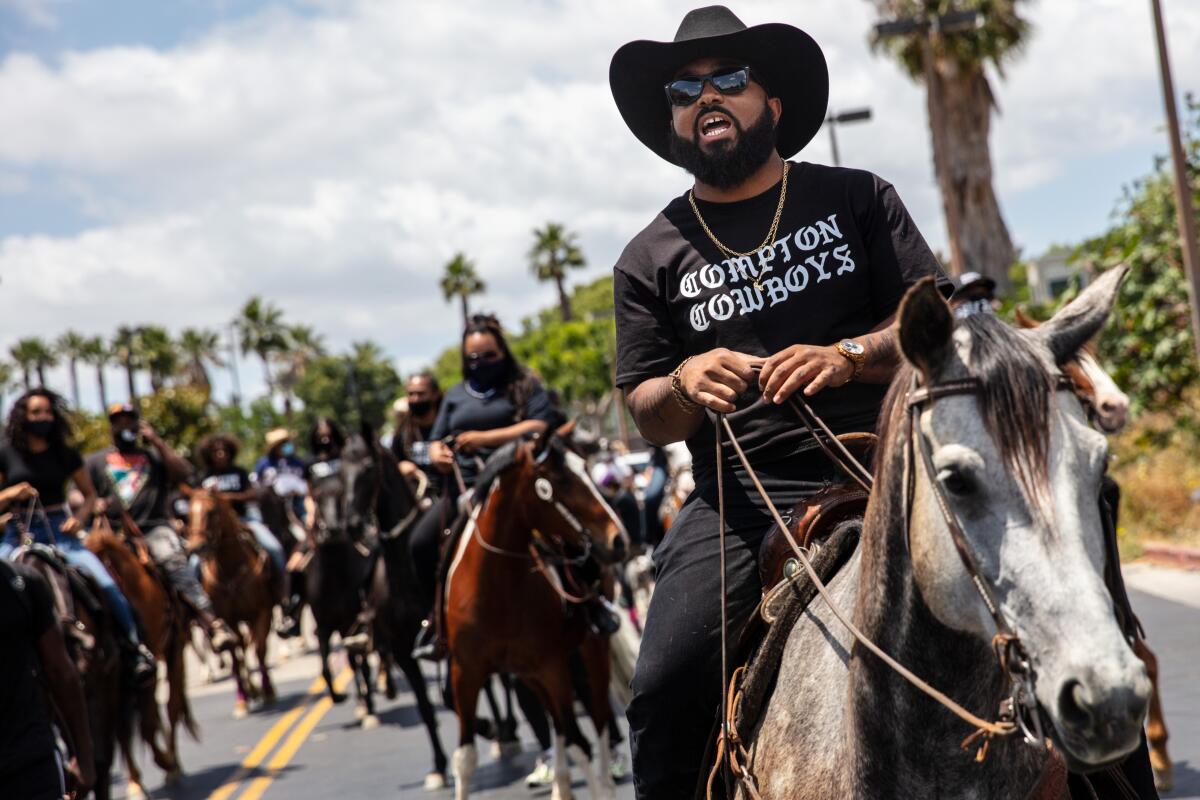
The story becomes tense at times as cowboy Randy Hook takes the reins of the organization and tries to steer it in a new direction. He has an ambitious vision of working for social justice by connecting Black rider communities across the country. But Hook struggles to find the resources needed to sustain the farm, and he clashes with his aunt Mayisha Akbar, founder of the Compton Jr. Posse, who seems reluctant to give up control.
Thompson-Hernández, who spent a year and a half embedded with the group, says several of the cowboys told him they often feel safer riding their horses on the busy streets of Compton than they do walking on the same streets.
As for the police, a scene near the book’s conclusion is telling. An African American officer pulls up in a squad car, dome lights flashing, tells the cowboys to “pull over,” and asks with a grin what they are doing on horses. “Nobody — including myself — laughed at his joke,” Thompson-Hernández writes.
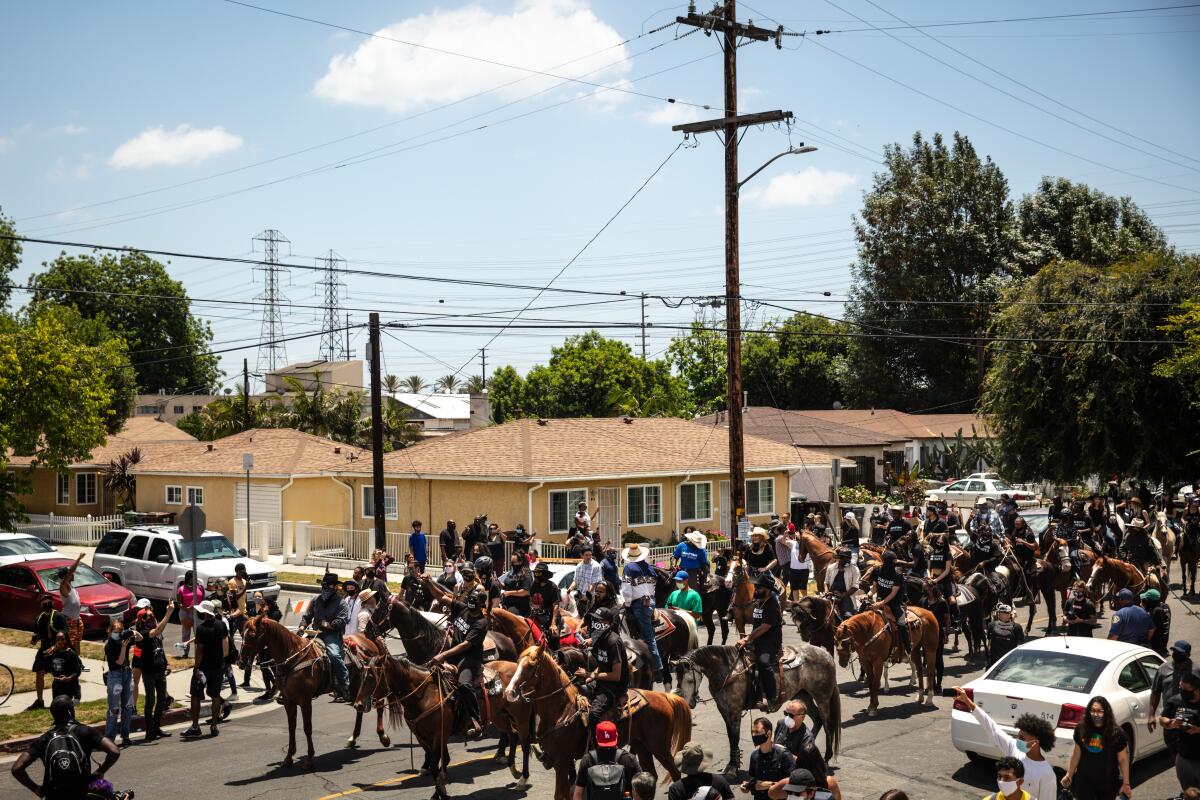
One of the cowboys’ missions is to reverse a Hollywood-engineered stereotype that makes bystanders look twice when they see a Black man or woman on a horse. In fact, there were thousands of Black cowboys across the West in the years after the Civil War, and African Americans who migrated from the rural South after World War II often brought their love of horses with them.
Now, the coronavirus pandemic has added another obstacle to the cowboys’ effort to save Richland Farms and attract a new generation of young people by making riding cool again. “This pandemic has really affected the ranch and their youth program,” Thompson-Hernández says. “Financially, they’ve taken a big hit. People have been furloughed, and they have had to sell a few horses.”
In his work, Thompson-Hernández says he draws on his background as an ethnographer, having received a master’s degree in Latin American studies from Stanford. While he feels privileged to have traveled the world as a journalist, the work on the book was literally a homecoming, as he stayed in his childhood home while doing research nearby.
“Being in Compton every day to write this book was a reminder of my childhood and of the friends who I once left,” he said. “The cowboys brought me back home and reminded me of who I am and who I was.”
Fresh off his first book, Thompson-Hernández has signed a contract to write a memoir, tentatively titled “Belonging,” that will explore his upbringing by a single mother and his drive to explore cultures on the fringes of society. He is finishing work on a seven-episode podcast for KPCC-FM (89.3), “California Love,” about Los Angeles and his experiences in the city, set to debut in early July.
If You Go: Book Club
Walter Thompson-Hernández, author of “The Compton Cowboys,” joins the L.A. Times Book Club in conversation with reporter Angel Jennings.
When: 7 p.m. June 24
Where: Free virtual event livestreaming on the Los Angeles Times Facebook page. Or tune in YouTube or Twitter.
More info: latimes.com/bookclub
Bio: Walter Thompson-Hernández
Born: 1985 (age 35)
Raised: In Huntington Park by a single mother who worked as a hotel parking attendant while studying for her Ph.D. in literature. His father, a college professor, was absent from his early life.
Education: University of Portland; master’s degree in Latin American studies from Stanford University. Additional graduate work at UCLA, in the Chicano studies Ph.D. program.
Background: Played professional basketball for three years in Latin America. Worked as a program counselor for two years in a Los Angeles-area mental health hospital. Worked for two years at the New York Times, writing and taking photographs as part of the “Surfacing” team, covering subcultures and marginalized communities around the world.
Current projects: “California Love,” upcoming podcast series on KPCC-FM (89.3). Forthcoming memoir, tentatively titled “Belonging.”
Won: Whiting Creative Nonfiction Grant for his book “The Compton Cowboys.”
Twitter: @WTHDZ.
On the web: wthdz.com/
Sign up for the Los Angeles Times Book Club
More to Read
Sign up for our Book Club newsletter
Get the latest news, events and more from the Los Angeles Times Book Club, and help us get L.A. reading and talking.
You may occasionally receive promotional content from the Los Angeles Times.
